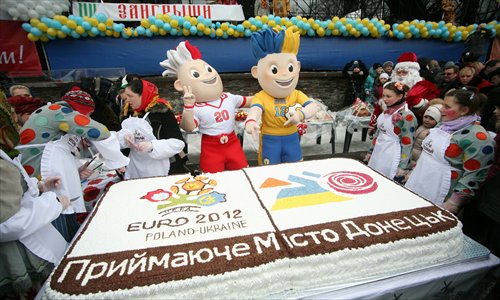Poland, Ukraine hail image boost

Even before the first match of the 16-team tournament kicked off in Warsaw on June 8, there had been widespread concerns about the wisdom of handing European football's showpiece tournament to Poland and the Ukraine.
Match concerns
Not only were there fears about the readiness of the eight match venues or key transport and other infrastructure but also the cost for fans, with some hotels ramping up prices, particularly in the Ukraine.
The threat of racist violence also loomed large, after the media aired a TV documentary showing far-right groups at stadiums making Nazi salutes and monkey noises at black players.
European countries, meanwhile, threatened to boycott matches in the Ukraine in protest of Kiev's alleged mistreatment of former prime minister Yulia Tymoshenko, who is in jail on what her supporters claim are politically motivated corruption charges.
But while there have been some problems, including racist chanting from foreign fans and some crowd trouble away from stadiums, notably between historic rivals Poland and Russia, the worst fears have not materialized.
Instead, the focus has remained mostly on the pitch, with high-quality matches with the continent's best players reflected in record television viewing figures in Europe and around the world, as well as high Internet traffic to official websites.
Reaching goals
"The overwhelming feeling I have today is pride," Michel Platini, president of European football's governing body, UEFA, told a news conference in Kiev.
"Pride for Poland and Ukraine, so often decried but who proved they were up to the task by putting on such a great tournament. And pride for the people of Poland and the Ukraine, who were such wonderful hosts."
The financial benefits of hosting such "mega-events" are a source of debate for economists. But Polish and Ukrainian authorities have both said the tournament and influx of hundreds of thousands of foreign fans have had a positive effect.
For Poland, the competition has gone a long way to overhauling the country's stereotyped image abroad of cold, grey, communist-era blight.
"We have succeeded on a global scale," Warsaw mayor Hanna Gronkiewicz-Waltz said. "Warsaw and Poland have never been so prominent in the international media and the consciousness of people worldwide."
Repeat visitors
A recent survey of more than 1,000 foreign fans by independent pollsters PBS indicated that 73 percent said they would come back within three years, while 89 percent said they would recommend Warsaw to family and friends.
Poland's Gazeta Wyborcza newspaper said Euro 2012 "will go down in history as the first big celebration involving virtually all of society since the festival of Solidarity."
For the Ukraine, which gained independence 21 years ago, there were similar benefits.
Ukrainian Football Federation president Grigory Surkis said Euro 2012 had brought "valuable benefits for generations of Ukrainians with infrastructure, hotels and airports."
On a human level, tournament organizer for Ukraine Markiyan Lubkyvskiy said, "Ukrainian fans and Ukrainians as a whole have shown themselves to be a kind nation, open to the world."
"Possibly this has been the most unexpected thing in the whole tournament."
What they said at the Euro 2012 tournament
"Everyone has to respect Greece because of its history and the principles of democracy, science... everything started from Greece, so it's very difficult for anyone to give us lessons." - Greece's Portuguese coach Fernando Santos alluding to EU pressure on the Greece to try to balance its books with crippling cuts.
"I already said that I am disappointed and angry." - Dutch striker Klaas-Jan Huntelaar on his reaction to losing out to Robin van Persie to start their first game against Denmark that saw the 2010 World Cup finalists, who had won all their qualifying matches, crash out pointless and led to Bert van Marwijk resigning shortly afterward.
"Do you know what he (Messi) was doing this time last year? He was going out of the Copa America in the quarterfinals." - Cristiano Ronaldo's withering response after he was asked about Danish fans calling out his Barcelona rival Lionel Messi's name following a misfiring performance against Denmark, he went on to score three goals as Portugal reached the semifinals.
"I am a man. I could be Peter Pan because I like to do things in my own way, I am a free spirit." - Mario Balotelli on the riddle that is the talented Italian striker.
"This is the style that has brought us success and it's the style that we can identify with. Don't forget, a few years back, this style changed the history of Spain forever, and I think that's enough." - Andres Iniesta's spirited and logical defense of the Spanish "tiki taka" style that attracted somewhat surprising criticism at Euro.
"It will send some signals to the country that we are going in the right direction. We're talking about a great generation of footballers. They have roots, and they know how to play together because they come from a country where they learn to play properly. This is a great era for Spanish soccer." - Spain coach Vicente Del Bosque after his side had put Italy to the sword 4-0 in the final.